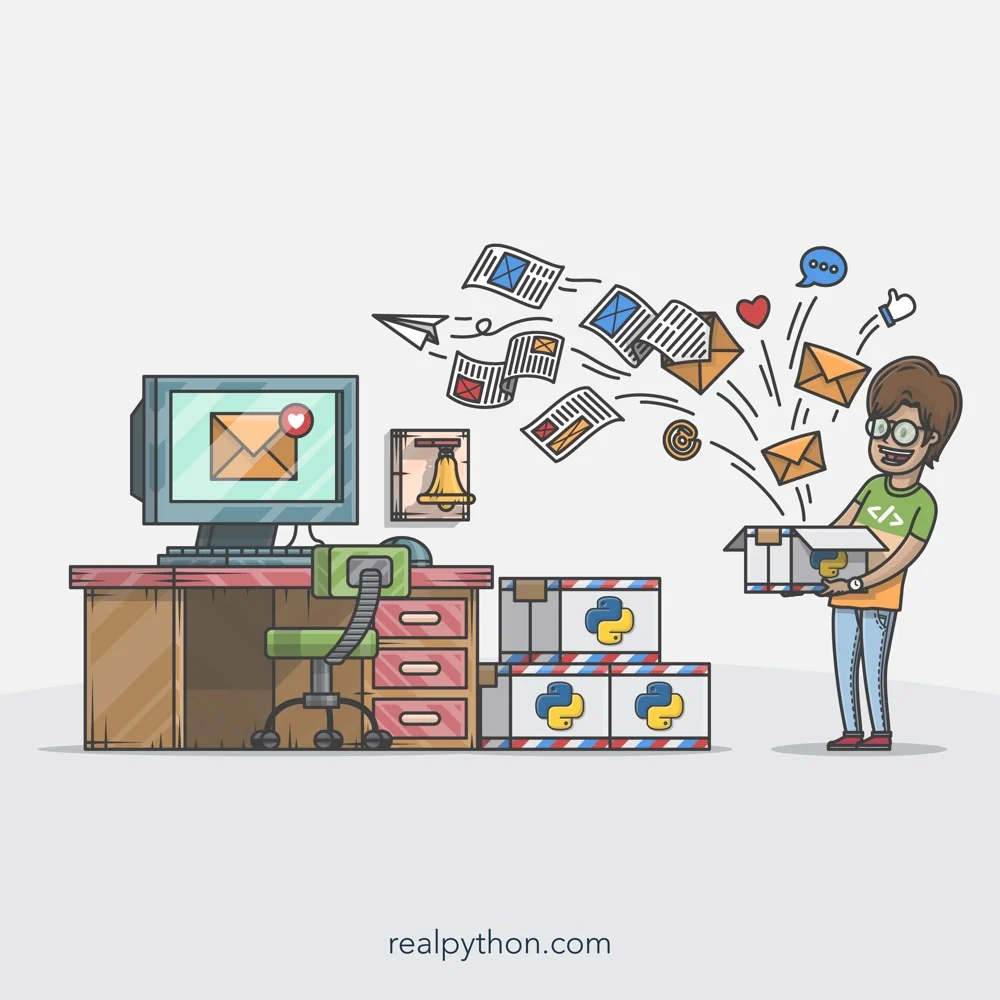Python is making history, and headlines. The much-anticipated Python: The Documentary premiered last month, capturing 34 years of programming history. But Python isn’t just looking back, it’s also moving forward at breakneck speed.
The recent developer surveys revealed Python’s explosive growth. At the same time, the Python Software Foundation paused its grants program amid unprecedented demand, PyPI implemented multiple security enhancements, while JetBrains announced a transition for PyCharm Community Edition into a unified product model.
Here’s what’s been happening in the world of Python!
Join Now: Click here to join the Real Python Newsletter and you’ll never miss another Python tutorial, course, or news update.
The Python Documentary Is Now Available on YouTube
At the end of August, Python: The Documentary premiered on YouTube, where you can watch it for free. It’s an 84-minute film tracing Python’s journey from Amsterdam side project to the world’s most popular programming language:
Produced by CultRepo (formerly Honeypot) and directed by Ida Bechtle, the documentary explores Python’s evolution and the community that shaped it. It features Guido van Rossum and key contributors like Mariatta and recent Real Python Podcast guest, Travis Oliphant.
The documentary also highlights the important role of PyLadies and addresses controversial topics including the Python 2 to 3 transition.
Note: If you want to take a deep dive into Python’s version history, then check out A History of Python Versions and Features.
The timing of Python: The Documentary couldn’t be better. While the film celebrates past achievements, the latest developer surveys show Python continues to thrive.
Developer Surveys Reveal Python’s Explosive Growth
JetBrains The State of Python 2025 and the Stack Overflow 2025 Developer Survey revealed Python’s remarkable growth:
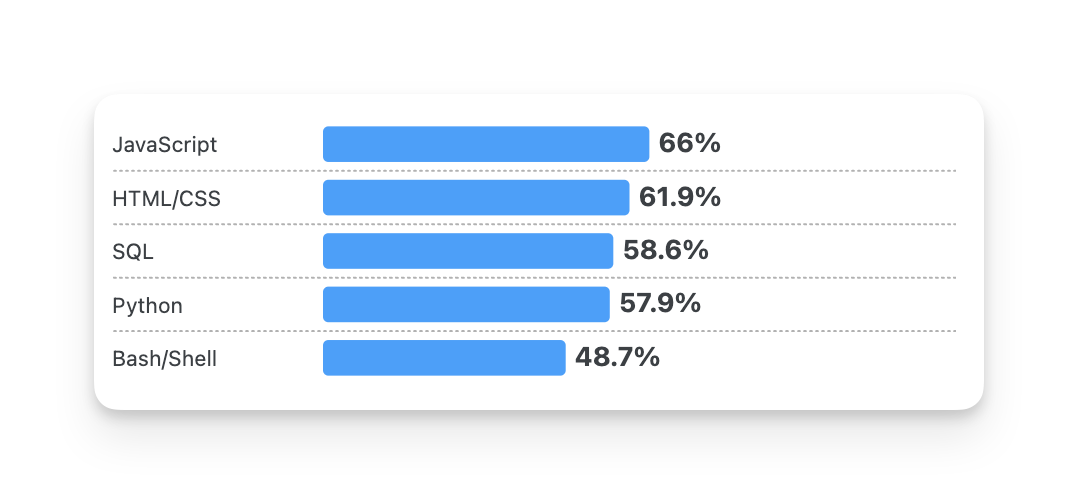
Python usage jumped seven percentage points to reach 57.9% of all developers, marking one of the largest year-over-year gains for any established language. Another exciting survey result is that 50% of respondents have two years or less of professional coding experience:
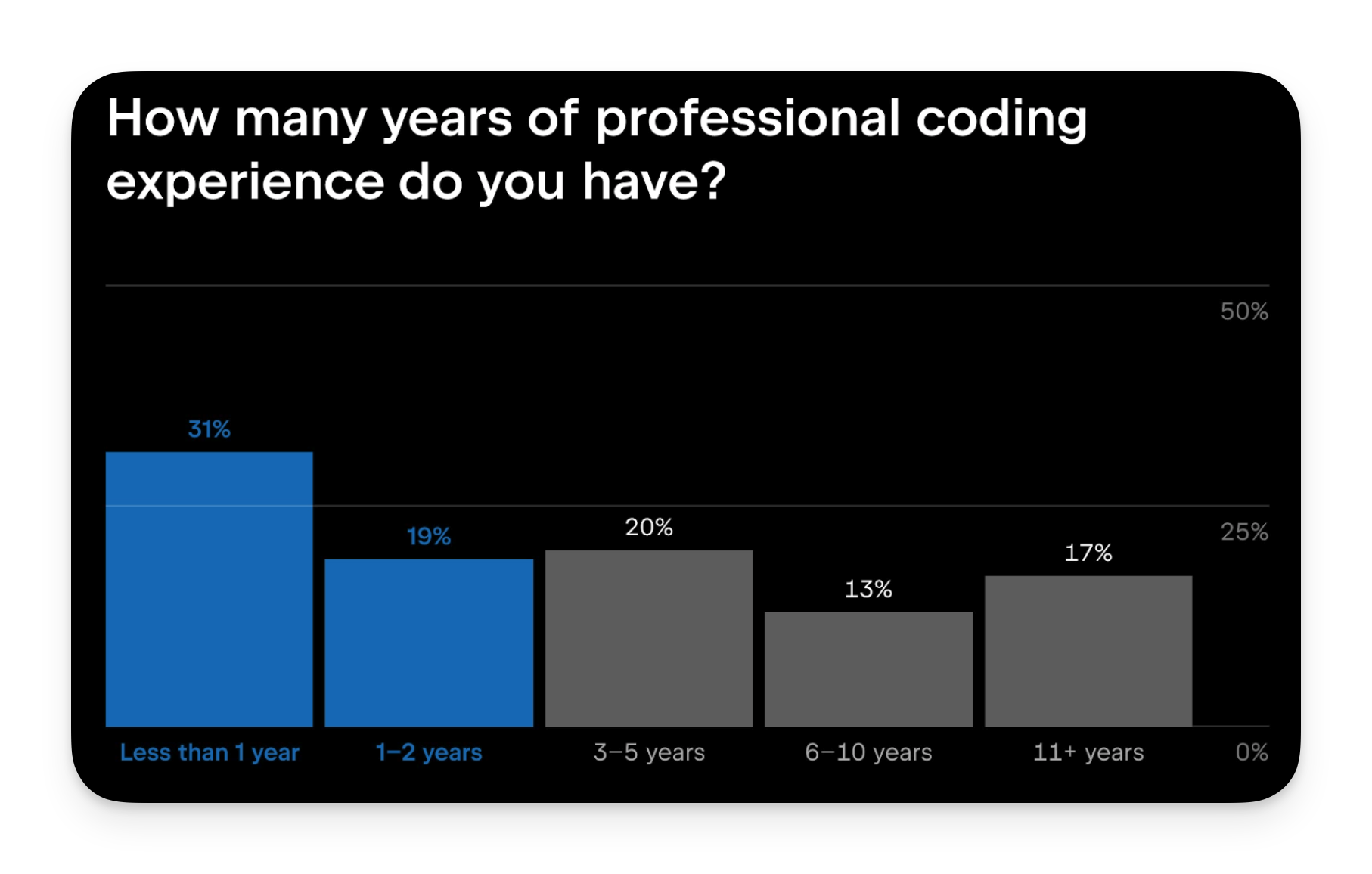
If you’re one of them and want to get started with Python, then this Introduction to Python Learning Path is perfect for you. One of the positively surprising results of the Stack Overflow survey is that uv came in first place as the most admired Stack Overflow tag:
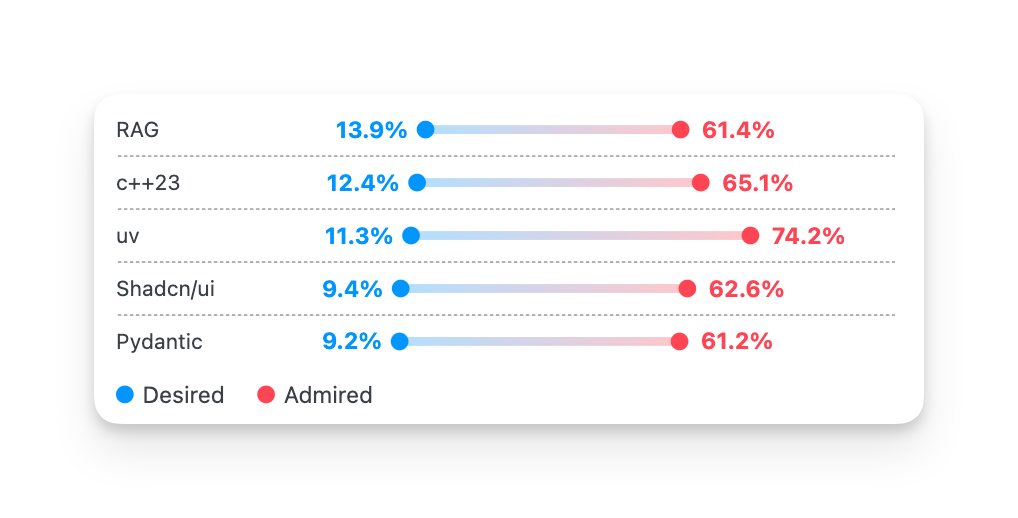
If you want to give uv a spin yourself, then you can check out the tutorials Managing Python Projects With uv and uv vs pip: Managing Python Packages and Dependencies. Another notable development is FastAPI’s jump in usage from 29% to 38% among Python developers:
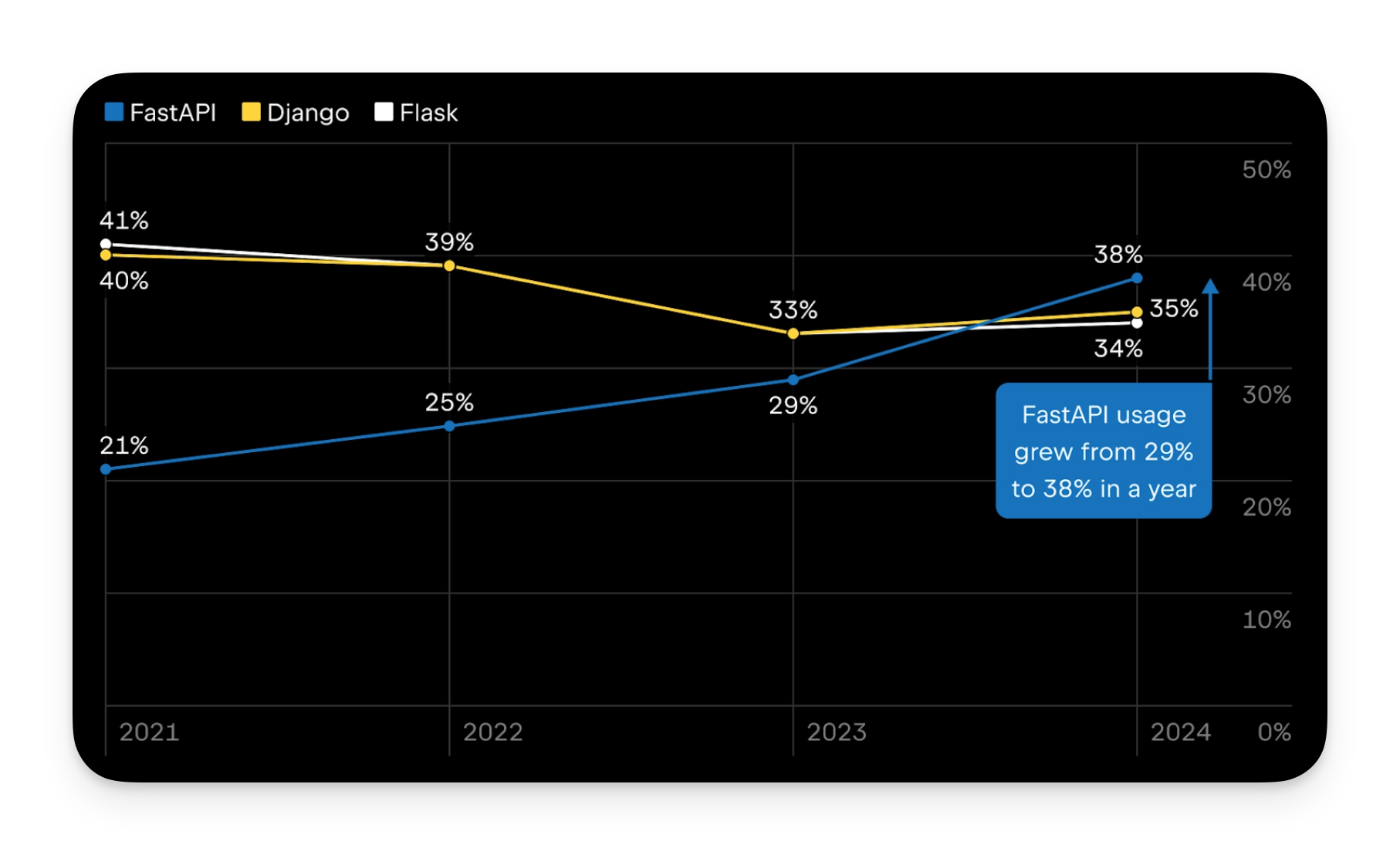
This nine-point increase in just one year signals a fundamental shift in how developers approach web development with Python. If you haven’t tried out FastAPI yourself, then have a close look at a FastAPI example application or gain practice by building a URL shortender with FastAPI.
Note: Despite the rise of FastAPI, Django and Flask are still highly relevant. You can explore all Python web frameworks in the Become a Python Web Developer learning path.
Around 44% of Python developers use AI coding tools daily, yet 46% actively distrust AI tool accuracy. Still, AI has a significant impact on Python programming, just like Python itself plays a central role in the development of AI.
AI and Python Are Vibing
At the beginning of August, OpenAI surprised the community by open-sourcing GPT-OSS models under Apache 2.0, enabling developers to run ChatGPT-like models locally.
The PyTorch 2.8 release brought 20% performance improvements for CPU-based LLM inference, while TensorFlow 2.20 improved GPU setup with automatic CUDA management.
Note: If you want to learn about the differences between these popular open-source libraries, then check out PyTorch vs TensorFlow for Your Python Deep Learning Project.
One of the biggest AI news stories from last month was the release of OpenAI’s GPT-5. In the video Surprising developers with GPT-5, Simon Willison even appears with his famous LLM benchmark of a pelican riding a bicycle:
After positive first impressions, the reviews of GPT-5 are mixed. The questionable charts that OpenAI showed during their GPT-5 reveal video probably didn’t help to build trust:
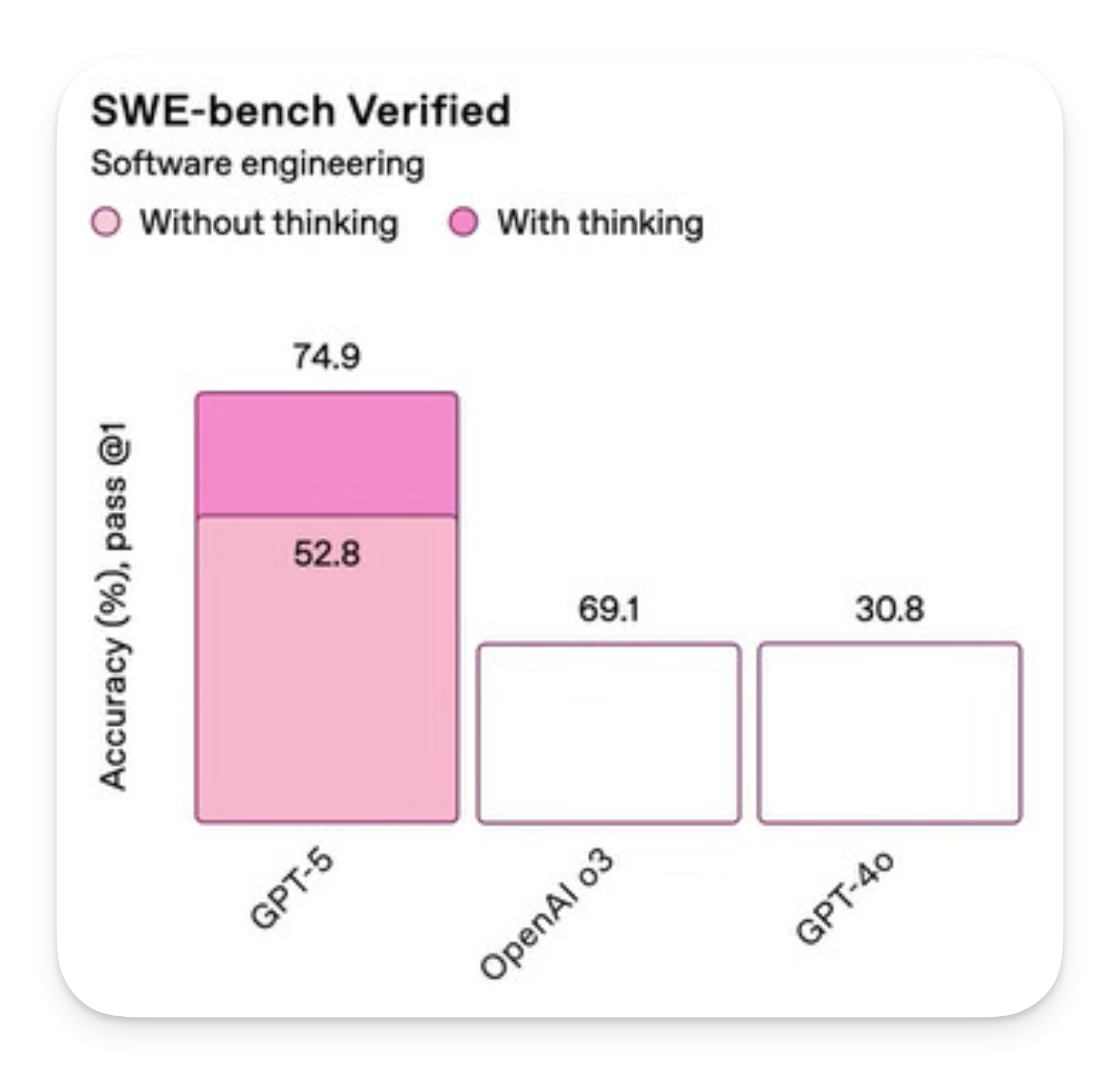
If you want to learn how to create more accurate charts, then you should definetely check out Real Python’s Data Visualization With Python learning path.
PyCharm Community Edition Discontinued
The release of PyCharm 2025.2 marks the end of the beloved PyCharm Community Edition. Starting with version 2025.3, PyCharm will transition to a unified product model:
All users now automatically start with a free one-month Pro trial. After that, you can subscribe to Pro or keep using the core features for free – now with Jupyter support included.
PyCharm Professional users are unaffected and will continue to enjoy full access to all Pro features in the unified product. (Source)
The change represents JetBrains’ effort to streamline their product offering. Rather than maintaining separate Community and Professional editions, the company is creating a single PyCharm application where core functionality remains free.
If you’re using PyCharm Community Edition and wondering what might change for you, then head over to PyCharm’s Unified Product FAQ, where they address common questions like these:
Yes, you can use PyCharm for free. Compared to PyCharm’s Pro subscription, you only have access to the essential tools and features for core Python development.
Yes, all features from PyCharm Community Edition are available in PyCharm at no cost. Since version 2025.2, you also have basic support for Jupyter Notebooks.
The most notable differences between PyCharm’s free version and the Pro version are JetBrains’ AI tools, full Jupyter Notebook support, remote development, and support for JavaScript-based front-end frameworks.
If you’re looking for alternatives to PyCharm, consider trying Visual Studio Code or emerging tools like Cursor and Zed.
PyPI Strengthens Security
As Python’s ecosystem grows and evolves, security becomes more and more critical. The Python Package Index (PyPI) implemented multiple security enhancements last month, responding to increasingly sophisticated attacks on the software supply chain that could affect every Python developer who installs packages.
PyPI announced measures to combat ZIP parser confusion attacks that could hide malicious code in wheel archives. By February 1, 2026, PyPI will reject any wheel archives containing duplicate filenames or mismatched headers. If you maintain packages on PyPI, then check for compliance warnings and update your build processes.
Note: Real Python’s got you covered! Check out How to Evaluate the Quality of Python Packages to learn how to spot malicious packages before downloading them.
PyPI now performs daily checks on all email domains to identify expired domains that could be hijacked for password reset attacks. Over 1,800 email addresses have been unverified since June 2025. If you use a custom domain for your PyPI account, ensure your domain registration remains current.
For other best practices in package management, see Real Python’s guides on using Python’s pip to manage dependencies and how to work with Python virtual environments.
Python Language Evolution: New Features and Enhancements
While the community navigates infrastructure changes, Python’s core development continues to advance with significant new features and improvements landing in upcoming releases.
Type System Enhancements Continue Evolution
Python’s type system received significant enhancements with multiple PEPs progressing through the approval process. PEP 728, accepted for Python 3.15, introduces extra_items and closed parameters to TypedDict, providing more precise control over dictionary schemas.
The typing ecosystem also saw mypy 1.17 released on July 14, adding optional exhaustive match checking and initial Python 3.14 support while dropping Python 3.8 compatibility. This release requires Python 3.9 or higher, reflecting the ecosystem’s gradual migration away from older versions.
For more on Python type checking, see Real Python’s comprehensive Python Type Checking Guide and How to Use Type Hints for Multiple Return Types in Python.
Python Profiling Gets Organized
Looking ahead to Python 3.15, PEP 799 proposes creating a dedicated profiling package to organize Python’s various profiling tools. The new structure would introduce profiling.tracing and profiling.sampling submodules, with the legacy profile module marked for deprecation and removal in Python 3.17.
Python Community: Challenges and Recognition
The Python community finds itself balancing celebrations with challenges, highlighting the tension between explosive growth and available resources.
Python Software Foundation Pauses Grants Program
In an unprecedented move that underscores the growing demands on Python’s infrastructure, the PSF announced on August 1 that it has paused its grants program after experiencing a 40% increase in funding requests.
The pause affects Python conferences, workshops, and community initiatives worldwide that depend on PSF support. The foundation plans quarterly reviews of the situation, with a potential reopening in early 2026. In their announcement, the PSF made a direct appeal:
The PSF needs more support from the corporations that have built their businesses on Python. (Source)
This funding crunch comes at a critical time when Python’s growth shows no signs of slowing. Companies benefiting from Python can support the ecosystem through the PSF sponsorship program.
Community Recognition and Leadership Changes
Despite financial constraints, the Python community continued celebrating its contributors. The PSF announced the August 2025 Community Service Awards, recognizing Rodrigo Girão Serrão for international Python advocacy, Katie McLaughlin for PyCon AU leadership, and Sarah Kuchinsky for diversity initiatives.
Note: If you want to know what Rodrigo is up to on Real Python, then check out his appearance in Episode 252 of the Real Python podcast and visit his profile on Real Python.
The PSF also opened nominations for its 2025 board elections and took over the operation of PyPI Stats after it transitioned to PSF operation, after creator Christopher Flynn maintained it as a volunteer project for over six years. Flynn continues as maintainer, ensuring continuity for this essential community resource.
Real Python Roundup
As usual, Real Python’s team crafted a hub of learning resources last month. The collection ranges from a deep dive into Python 3.14’s lazy annotations to practical guides on docstrings, the with statement, and working effectively with JSON. You’ll also find articles on naming with single and double underscores, using mixin classes, and controlling loop flow with continue.
Whether you’re documenting code, managing resources safely, or exploring new Python 3.14 features, there’s something here to expand your toolkit and fuel your curiosity.
Our recent video courses are all about sharpening essential Python skills. They cover t-strings, object internals, copying semantics, and performance profiling. These lessons will help you write clearer, faster code with confidence.
If you’re looking to reinforce what you’ve learned, this month’s quizzes have you covered. From annotation changes in Python 3.14 to fundamentals like setup and copying, these quick challenges will help keep your Python knowledge fresh.
If you enjoy engaging, thoughtful conversations with Python professionals, don’t miss the latest episodes of The Real Python Podcast. Host Christopher Bailey chats with developers, educators, and open-source contributors each week about real-world tools, best practices, and community stories.
Real Python’s growing reference area continues to expand, with hundreds of concise definitions that link out to in-depth tutorials, courses, and quizzes. You can skim quickly or explore deeply as your curiosity takes you.
What’s Next for Python?
The Python documentary has captured Python’s journey from hobby project to AI powerhouse. Surveys show Python’s rapid growth, even as the PSF temporarily pauses its grants program to manage increased demand.
Whether you’re one of the 50% of developers new to Python or a veteran who remembers the Python 2 to 3 transition, you’re part of a vibrant ecosystem where we’re navigating these changes together. The documentary captured Python’s journey so far, but the most exciting chapters are still ahead.
Join Now: Click here to join the Real Python Newsletter and you’ll never miss another Python tutorial, course, or news update.





